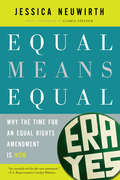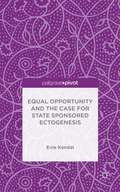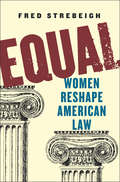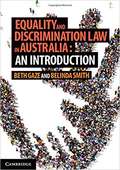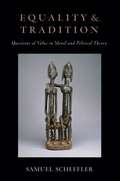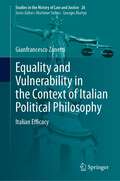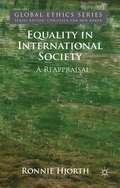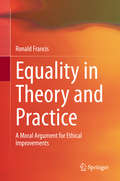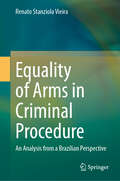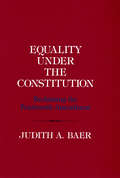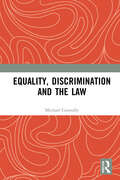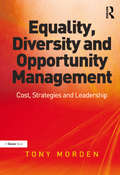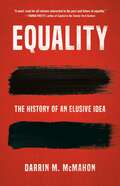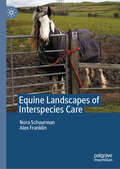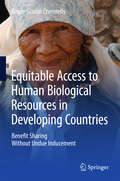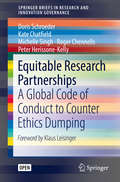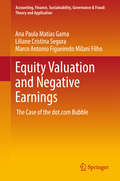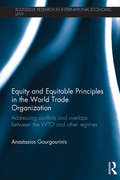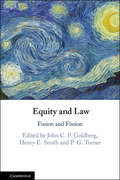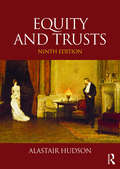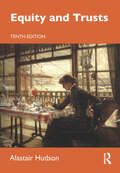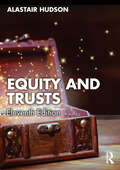- Table View
- List View
Equal Means Equal
by Gloria Steinem Jessica NeuwirthWhen the Equal Rights Amendment was first passed by Congress in 1972, Richard Nixon was president and All in the Family's Archie Bunker was telling his feisty wife Edith to stifle it. Over the course of the next ten years, an initial wave of enthusiasm led to ratification of the ERA by thirty-five states, just three short of the thirty-eight states needed by the 1982 deadline. Many of the arguments against the ERA that historically stood in the way of ratification have gone the way of bouffant hairdos and Bobby Riggs, and a new Coalition for the ERA was recently set up to bring the experience and wisdom of old-guard activists together with the energy and social media skills of a new-guard generation of women.In a series of short, accessible chapters looking at several key areas of sex discrimination recognized by the Supreme Court, Equal Means Equal tells the story of the legal cases that inform the need for an ERA, along with contemporary cases in which women's rights are compromised without the protection of an ERA. Covering topics ranging from pay equity and pregnancy discrimination to violence against women, Equal Means Equal makes abundantly clear that an ERA will improve the lives of real women living in America.
Equal Opportunity and the Case for State Sponsored Ectogenesis
by Evie KendalEctogenesis refers to the artificial gestation of a fetus outside the womb. Despite certain advantages for women's reproductive liberty, feminist groups remain divided regarding this technology. This book argues that reproduction imposes unjust burdens on women, and thus the ideals of equal opportunity demand continued research into ectogenesis.
Equal: Women Reshape American Law
by Fred StrebeighThe dramatic, untold story of how women battled blatant inequities in America's legal system. As late as 1967, men outnumbered women twenty to one in American law schools. With the loss of deferments from Vietnam, law schools admitted women to avoid plummeting enrollments. As women entered, the law resisted. Judges would not hire women. Law firms asserted a right to discriminate against women. Judges permitted discrimination against pregnant women. Courts viewed sexual harassment as, one judge said, "a game played by the male superiors." Against the odds, women fought to reshape the law. Fred Strebeigh has interviewed litigators, plaintiffs, and judges, including Ruth Bader Ginsburg and Catharine MacKinnon, and has done research in their private archives as well as those of other attorneys who took cases to the Supreme Court to make the law equal and just for all.
Equality and Discrimination Law in Australia: An Introduction
by Beth Gaze Belinda SmithEquality and Discrimination Law in Australia: An Introduction explores four decades of anti-discrimination laws in Australia. Beth Gaze and Belinda Smith argue that effective laws protecting against and deterring discrimination are vital for a fair future, and emphasise the theoretical and social contexts that underpin this area of the law. The text is divided into three sections: the first addresses the social and conceptual context, history and framework of anti-discrimination laws; the second analyses the main elements of the law and the processes of enforcement; and the third explores broader avenues for pursuing equality beyond simply prohibiting discrimination. Written in a clear and concise style, Equality and Discrimination Law in Australia: An Introduction is a vital resource for students.
Equality and Tradition: Questions of Value in Moral and Political Theory
by Samuel SchefflerThis collection of essays by noted philosopher Samuel Scheffler combines discussion of abstract questions in moral and political theory with attention to the normative dimension of current social and political controversies. In addition to chapters on more abstract issues such as the nature ofhuman valuing, the role of partiality in ethics, and the significance of the distinction between doing and allowing, the volume also includes essays on immigration, terrorism, toleration, political equality, and the normative significance of tradition. Uniting the essays is a shared preoccupation with questions about human value and values. The volume opens with an essay that considers the general question of what it is to value something - as opposed, say, to wanting it, wanting to want it, or thinking that it is valuable. Other essays exploreparticular values, such as equality, whose meaning and content are contested. Still others consider the tensions that arise, both within and among individuals, in consequence of the diversity of human values. One of the overarching aims of the book is to illuminate the different ways in whichliberal political theory attempts to resolve conflicts of both of these kinds.
Equality and Vulnerability in the Context of Italian Political Philosophy: Italian Efficacy (Studies in the History of Law and Justice #26)
by Gianfrancesco ZanettiOne of the main goals of this book is to determine if, in the works of some of the key authors in the history of Italian political philosophy, a notion of “efficacy” can be found. In legal philosophy, “efficacy” is the capacity a norm has to effectively influence citizens’ behavior. The “principle of efficacy” is that according to which an order or rule exists as such when it is followed effectively in practice. Here by “efficacy” I mean the idea that normative phenomena are self-justifying, without reference to extrinsic systems of value (such as “natural law”). The examinations of several texts undertaken here constitute reflections on this theme, without any claim to systematicity. They have been grouped together, roughly in historical order, by their common respect for the contexts within which they reason and reach decisions, which lends them a characteristic flavor of harsh realism that at times relies on a minimalist use of traditional normative categories.The second theme that emerges through the respective chapters (each of which constitutes the text for a lesson in a course for Ph.D. students) is that of the relationship between “equality” and “vulnerability.” Here the idea is to elaborate a concept of “vulnerability” that is not underpinned by what we in Italy call an “anthropology,” that is, a fixed notion of human nature. Instead this concept should be comprehensible and graspable solely on the basis of the recognition of decisions and actions that are merely “efficacious,” that function “for what they are, and what they do.” This recognition doesn’t even need to be explicitly articulated by these authors with any specific, deliberately conscious awareness.The goal is not to identify a precise tradition of thought, one which elaborates a given line of reflection, but rather to highlight certain “themes” that emerge in the texts examined, even as the authors write with and for their own specific, contingent set of motives, which differ from time to time and place to place. These authors include some who are widely known, such as Dante, Machiavelli, and Beccaria. At times they are figures who typify certain key historical episodes, such as the Risorgimento (Giuseppe Mazzini) or Fascism (Cesare Lombroso and Santi Romano), while others reflect certain aspects of a contemporary debate (Pasolini and the “Braibanti affair”).The book is based on lectures given for a 2021 Ph.D. Course at the University of California, Berkeley’s Department of Italian Studies.
Equality in International Society
by Ronnie HjorthThe author re-examines the concept of equality in international society, past and present. The conventional view that equality of states necessarily flows from sovereignty, that it is a corollary to sovereignty or simply a synonym, is considered a contingent rather than a necessary contention. The main argument is that equality in global international society should be theorised anew, restoring the normative strength of the principle. It is shown how concepts of equality make intelligible different normative and ethical conceptions of the modern political space in the past. Drawing on the works of such diverse theorists as Hans Kelsen, Peter Singer, John Rawls and Michael Oakeshott, the author suggests how a renewed interest in equality contributes to making international society a more inclusive, egalitarian, and credible moral and political association.
Equality in Theory and Practice: A Moral Argument for Ethical Improvements
by Ronald FrancisThis book is an account of the concept of equality from the perspective of both theory and practice, and presents methods of quantifying values. It considers both arguments and evidence, and tackles equality in its different forms, including economic equality, education, equality before the law, equality of opportunity, and gender equality. The book shows that inequality is a profoundly moral question, noting that there are good practical reasons for its adoption. It presents a consideration of classical theories from Aristotle to Hume, as well as contemporary approaches such as those offered by Rawls, Haidt, Temkin, and Parfit. It also contemplates issues such as the naturalistic fallacy, and considers what is different about the Goleman view of moral sensitivity and the ethical personality. The array of evidence includes the impact of climate and various plants such as sugar and cotton on the slave trade, the concept of Gaia, Darwinism, sex inequality, personality, culture, psychological issues, and the quantification of ethics. The book concludes with some practical suggestions for improving equality. It aims to raise awareness of the ways in which equality can be understood, and achieved. It will be relevant to students and scholars in philosophy, human rights, and law.
Equality of Arms in Criminal Procedure: An Analysis from a Brazilian Perspective
by Renato Stanziola VieiraThis book addresses the principle of equality of arms and its impact on the Brazilian criminal procedure. It begins with the connection understood to exist between this principle and the constitutional matrix of equal treatment in the process. Starting from this constitutional framework, the focus is on equality as a fundamental rights norm, leading to the core issue: equality of arms as an emanation of equality and its impact on criminal proceedings. A brief overview of some of the main characteristics of contemporary criminal procedural systems is then necessary. This is done either to support the understanding that no single system truly exists or to position equality of arms closer to the evolution of the so-called adversarial system. The analysis outlines the concept of equality of arms based on comparative criminal procedural law, notably drawing from the understandings of international bodies that pay detailed attention to it, such as the European Court of Human Rights and the United Nations Human Rights Committee. By considering foreign criminal procedural law doctrine, or its development outside Brazil, the aim is to test the application hypotheses in the Brazilian criminal procedural scenario. The work particularly examines the incidence of equality of arms in various aspects of current and projected Brazilian criminal procedural law. Ultimately, recognizing the principle's incidence and its character as a fundamental normative principle based on the constitutional backdrop, propositions are formulated to better delineate Brazilian criminal procedural law in adherence to this principle.
Equality under the Constitution: Reclaiming the Fourteenth Amendment
by Judith A. BaerThe principle of equality embedded in the Declaration of Independence and reaffirmed in the Constitution does not distinguish between individuals according to their capacities or merits. It is written into these documents to ensure that each and every person enjoys equal respect and equal rights. Judith Baer maintains, however, that in fact American judicial decisions have consistently denied individuals the form of equality to which they are legally entitled—that the courts have interpreted constitutional guarantees of equal protection in ways that undermine the original intent of Congress. In Equality under the Constitution, Baer examines the background, scope, and purpose of the Constitution’s Fourteenth Amendment and the history of its interpretation by the courts. She traces the development of the idea of equality, drawing on the Bill of Rights, Congressional records, the Civil War amendments, and other sections of the Constitution. Baer discusses many of the significant equal-protection cases decided by the Supreme Court from the time of the amendment’s ratification, including decisions on reverse discrimination, age discrimination, the rights of the disabled, and gay rights. She concludes with a theory of equality more faithful to the history, language, and spirit of the Constitution.
Equality within Our Lifetimes: How Laws and Policies Can Close—or Widen—Gender Gaps in Economies Worldwide
by Jody Heymann Aleta Sprague Amy RaubA free ebook version of this title is available through Luminos, University of California Press’s Open Access publishing program. Visit www.luminosoa.org to learn more. Well into the twenty-first century, achieving gender equality in the economy remains unfinished business. Worldwide, women’s employment, income, and leadership opportunities lag men’s. Building and using a one-of-a-kind database that covers 193 countries, this book systematically analyzes how far we’ve come and how far we have to go in adopting evidence-based solutions to close the gaps. Spanning topics including girls’ education, employment discrimination of all kinds, sexual harassment, and caregiving needs across the life course, the authors bring the findings to life through global maps, stories of laws’ impact in courts and beyond, and case studies of making change. A powerful call to action, Equality within Our Lifetimes reveals how gender equality is both feasible and urgently needed to address some of the greatest challenges of our generation.
Equality, Discrimination and the Law
by Michael ConnollyIn identifying a number of ‘fuzzy border’ cases (notably where pensionable age, pregnancy, residence, and marriage, are proxies for unlawful discrimination), Equality, Discrimination and the Law argues that the traditional notions of discrimination and victimisation are inadequate to implement equality policy and cannot represent fully the reality of discriminatory practices. When Mr and Mrs James - each aged 61 - went swimming, Mr James was charged for entry, while Mrs James was admitted free. The reason was that the local authority offered free swimming to those of ‘pensionable age’ (at the time, 65 for men and 60 for women). The House of Lords found that Mr James had suffered direct sex discrimination. This majority plurality decision indicated that sometimes a given set of facts does not neatly accord to traditional definitions of discrimination. This in turn encourages the judiciary to shape the law to fit the facts, which results in an inconsistent body of law full of ‘fuzzy borders’. Starting with the James case, this book investigates a number of ‘fuzzy border’ cases in the EU and UK based on nationality discrimination, notions of indirect discrimination, pregnancy and sex discrimination, marriage and sexual orientation discrimination, perceived discrimination, and victimisation. The argument concludes that fixed notions such as ‘direct and indirect discrimination are mutually exclusive’ do not stand up to scrutiny and that it must be recognised that the traditional concepts of discrimination and victimisation do not reflect the reality of practice. This work is essential reading for students, scholars and practitioners in all EU and English-speaking jurisdictions, particularly post-graduates, Policy/Law-makers, and those on dedicated equality undergraduate courses.
Equality, Diversity and Opportunity Management: Costs, Strategies and Leadership
by Tony MordenEquality, Diversity and Opportunity Management presents a comprehensive analysis of the processes of governance, leadership, policy and strategy formulation, decision-making, practical and financial management, and real-world implementation of the Equality, Diversity, Opportunity, and Discrimination (or anti-Discrimination) Agenda. The leadership, cost, and management of the Agenda for Equality, Diversity, Opportunity, and Discrimination (or anti-Discrimination) is discussed in three mandatory areas: ¢ Employment and the Workplace ¢ Service Provision and customer service ¢ Neighbourhood and Community Management The necessary choice of these three key areas of application reflects a typical focus of government policy, legislation, and case law for the UK, Europe, North America, Australia, New Zealand, and in many other countries that implement active Human Rights Agendas. You will find the book strongly orientated towards issues of corporate governance, personal and vicarious responsibility, leadership, cost management, implementation, and delivery. It deals directly, professionally, and in a non-opinionated manner with challenging (and sometimes unpopular or unwanted) issues of equality and inequality, diversity, a lack of opportunity or social mobility, and the widespread incidence of discrimination. The work suggests practical and realistic means to deal with such issues, whether at the level of corporate governance, leadership, policy and strategy, the incurring of unnecessary cost, or at the level of operational and departmental management procedure and process. Equality, Diversity and Opportunity Management is written at the same time from scholarly, objective, applied, proportionate, ’hands-on’, and practitioner based perspectives.
Equality: The History of an Elusive Idea
by Darrin M. McMahonThe definitive history of the idea of equality—and why we&’re so ambivalent about it Equality is in crisis. Our world is filled with soaring inequalities, spanning wealth, race, identity, and nationality. Yet how can we strive for equality if we don&’t understand it? As much as we have struggled for equality, we have always been profoundly skeptical about it. How much do we want, and for whom? Darrin M. McMahon&’s Equality is the definitive intellectual history, tracing equality&’s global origins and spread from the dawn of humanity through the Enlightenment to today. Equality has been reimagined continually, in the great world religions and the politics of the ancient world, by revolutionaries and socialists, Nazis and fascists, and postwar reformers and activists. A magisterial exploration of why equality matters and why we continue to reimagine it, Equality offers all the tools to rethink equality anew for our own age.
Equine Landscapes of Interspecies Care
by Nora Schuurman Alex FranklinThis book focuses on the spaces and practices of caring for horses, explored in a series of case studies set across the equine lifespan. For horses, everyday practices of care as well as ever-changing understandings of what is good care directly shape their living conditions and lives with humans. In this book, questions of animal ethics and welfare are approached in a tangible way by exploring the relationships and practices of interspecies care across a range of different spaces, including horse yards, training grounds, farms, rescue centres and the street. The chapters illuminate the ways in which interspecies care ties horses to human society and culture, addressing care practices in different stages of the equine life cycle. Through a unique set of case-studies addressing issues such as training, working, rescue, aging and death, the book offers a clear overview of how humans shape the lifespan of animals living under their care. It simultaneously foregrounds the agency of animals in this process and how such agency is interpreted and responded to by humans. With its theoretically solid analysis of rigorous empirical study, the book answers the need to understand human connection to the nonhuman world within the everyday practices and spaces of contemporary society and culture.
Equitable Access to Human Biological Resources in Developing Countries
by Roger Scarlin ChennellsThe main question explored by the book is: How can cross-border access to human genetic resources, such as blood or DNA samples, be governed in such a way as to achieve equity for vulnerable populations in developing countries? The book situates the field of genomic and genetic research within global health and research frameworks, describing the concerns that have been raised about the potential unfairness in exchanges during recent decades. Access to and sharing in the benefits of human biological resources are aspects not regulated by any international legal framework such as the Convention on Biological Diversity, which applies only to the exchange of plants, animals and microorganisms, as well as to associated traditional knowledge. Examples of genetic research perceived as exploitative are provided in order to illustrate the legal vacuum concerning the global governance of human genetic resources. The main conclusions drawn from the legal and ethical analysis are: * Benefit sharing is crucial in order to avoid the exploitation of developing countries in human genetic research. * With functioning research ethics committees, undue inducement is less of a concern in genetic research than in other areas of medical research (e. g. clinical trials). * Concerns remain over research involving indigenous populations; accordingly, recommendations are provided. In drawing these conclusions, the book addresses in detail a highly pressing topic in global bioethics and international law. In this regard, it combines bioethical arguments with jurisprudence, in particular with reference to the law of equity and the legal concepts of duress (coercion), unconscionable dealing, and undue inducement.
Equitable Principles of Maritime Boundary Delimitation
by Thomas CottierEquity emerged as a powerful symbol of aspired redistribution in international relations. Operationally, it has had limited impact in the Westphalian system of nation states - except for maritime boundary delimitations. This book deals with the role of equity in international law, and offers a detailed case study on maritime boundary delimitation in the context of the enclosure movement in the law of the sea. It assesses treaty law and the impact of the United Nations Convention on the Law of the Sea. It depicts the process of trial and error in the extensive case law of the International Court of Justice and arbitral tribunals and expounds the underlying principles and factors informing the methodology both in adjudication and negotiations. Unlike other books, the main focus is on equity and its implications for legal methodology, in particular offering further guidance in the field of international economic law.
Equitable Research Partnerships: A Global Code of Conduct to Counter Ethics Dumping (SpringerBriefs in Research and Innovation Governance)
by Doris Schroeder Roger Chennells Kate Chatfield Peter Herissone-Kelly Michelle SinghThis open access book offers insights into the development of the ground-breaking Global Code of Conduct for Research in Resource-Poor Settings (GCC) and the San Code of Research Ethics. Using a new, intuitive moral framework predicated on fairness, respect, care and honesty, both codes target ethics dumping – the export of unethical research practices from a high-income setting to a lower- or middle-income setting. The book is a rich resource of information and argument for any research stakeholder who opposes double standards in research. It will be indispensable for applicants to European Union framework programmes, as the GCC is now a mandatory reference document for EU funding.
Equity Valuation and Negative Earnings
by Ana Paula Matias Gama Liliane Cristina Segura Marco Antonio Figueiredo Milani FilhoBuilding upon Feltham and Ohlson models, this book examines positive loss-earnings within the context of the dot. com bubble during the boom years of the late 1990s bull market. The strong demand for equity financing captured the imagination of investors from Europe and U. S. like never before. With a focus on U. S. Internet companies, the book explores both the birth and the death of the new economy, and how negative earnings and losses still garnered large investments and successful IPOs (Initial Public Offerings). As Internet based ventures and the digital economy keep attracting large amounts of equity financing, this book explains that there is something unique in the valuation and pricing of tech companies. The book was written for corporate financiers, capital market professionals, and academics to further their understanding of equity valuation and the effects of equity trading.
Equity and Administration
by P. G. TurnerEach generation of lawyers in common law systems faces an important question: what is the nature of equity as developed in English law and inherited by other common law jurisdictions? While some traditional explanations of equity remain useful - including the understanding of equity as a system that qualifies the legal rights people ordinarily have under judge-made law and under legislation - other common explanations are unhelpful or misleading. This volume considers a distinct and little noticed view of equity. By examining the ways in which courts of equity have addressed a range of practical problems regarding the administration of deliberately created schemes for the management of others' affairs, modern equity can be seen to have a strongly facilitative character. The extent and limits on this characterisation of equity are explored in chapters covering equity's attitude to administration in various public and private settings in common law systems.
Equity and Equitable Principles in the World Trade Organization: Addressing Conflicts and Overlaps between the WTO and Other Regimes (Routledge Research in International Economic Law)
by Anastasios GourgourinisThis book analyses whether, and how, equity and equitable principles can be employed as juridical tools in the legal reasoning of judges and lawyers in World Trade Organization (WTO) disputes where there is interaction between norms derived from the multilateral trade regime and other international legal regimes. Bringing the literature on equity and equitable principles in international law up to date this book tackles several legal problems which have emerged in WTO dispute settlement practice as well as engaging with the concept of the fragmentation of international law. The book provides an original argument about the role and significance of equity and equitable principles in the debate over fragmentation by providing a coherent methodology for addressing conflicts and overlaps between WTO and non-WTO norms in the context of Dispute Settlement Body proceedings.
Equity and Law: Fusion and Fission
by Goldberg P. G. Turner John C. P. Henry E. SmithThe fusion of law and equity in common law systems was a crucial moment in the development of the modern law. Common law and equity were historically the two principal sources of rules and remedies in the judge-made law of England, and this bifurcated system travelled to other countries whose legal systems were derived from the English legal system. The division of law and equity - their fission - was a pivotal legal development and is a feature of most common law systems. The fusion of the common law and equity has brought about major structural, institutional and juridical changes within the common law tradition. In this volume, leading scholars undertake historical, comparative, doctrinal and theoretical analysis that aims to shed light on the ways in which law and equity have fused, and the ways in which they have remained distinct even in a 'post-fusion' world.
Equity and Trusts
by Alastair HudsonAlastair Hudson’s Equity and Trusts is an ideal textbook for undergraduate courses on the law of trusts and equitable remedies. It provides a clear, current and comprehensive account of the subject. The author’s enthusiasm and expertise shine through, helping to bring to life an area of the law which students often find challenging. This Ninth Edition has been extensively re-written but remains the same book in spirit as it has always been. It contains an analysis of the important decisions of the Supreme Court in FHR European Ventures v Cedar Capital, Jones v Kernott, and Williams v Central Bank of Nigeria, and the important decisions in Charity Commission v Framjee, Rawstron v Freud, Patel v Mirza, Federal Republic of Brazil v Durant, Hodkin, Novoship v Mihaylyuk, National Crime Agency v Robb, St Andrews (Cheam) Lawn Tennis Club, the after-effects of the Lehman Brothers collapse; and analysis of many other new cases besides. Equity and Trusts remains the most comprehensive and up-to-date coverage of the law of Equity and Trusts, while still a lively and thoughtful account of the issues raised by it. This book has been cited as being authoritative in the courts of numerous countries. The ninth edition is supported by the author's website at www.alastairhudson.com with brand new resources including: • short podcasts discussing and clarifying key topics from within the book, which cover an entire course; • complete lecture recordings made specifically to accompany this book; • New video documentaries bringing to life selected key topics; • A host of other online materials and study guides new for 2016. Review of a previous edition: ‘One of the book’s great strengths is its clear exposition of some very difficult areas of the law, moving seamlessly from points that puzzle students to points that puzzle practitioners. Other strengths are the breadth of its approach, the fact that it is extremely up to date, the freshness and vividness of its approach and its willingness to place equity in a wider context .?.?. The student will enjoy a clear, lively and challenging account of the subject matter. The practitioner will find the book well worth consulting for its clear exposition of the basic principles and of their application in difficult areas.’ – New Law Journal.
Equity and Trusts
by Alastair HudsonAlastair Hudson’s Equity and Trusts is an ideal textbook for undergraduate courses on the law of trusts and equitable remedies. It provides a clear, current and comprehensive account of the subject. The author’s enthusiasm and expertise shine through, helping to bring to life an area of the law which students often fi nd challenging. The tenth edition of Equity and Trusts remains the most comprehensive and up-to-date coverage of the law of Equity and Trusts, while still a lively and thoughtful account of the issues raised by it. This book has been cited as being authoritative in the courts of numerous countries. The tenth edition is supported by the author’s website at www.alastairhudson.com with brand new resources including: • short podcasts discussing and clarifying key topics from within the book, which cover an entire course; • complete lecture recordings made specifi cally to accompany this book; • video documentaries bringing to life selected key topics; • a host of other online materials and study guides new for 2021.
Equity and Trusts
by Alastair HudsonAlastair Hudson’s Equity and Trusts is the ideal textbook for undergraduate courses on the law of trusts and equitable remedies. It provides a clear, current and comprehensive account of the subject. The author’s enthusiasm and expertise shine through, helping to bring to life an area of the law which students often find challenging. It has been cited as being authoritative in the courts of numerous countries.The eleventh edition of Equity and Trusts continues to offer the most comprehensive and up-to-date coverage of the law of Equity and Trusts, while still presenting a lively and thoughtful account of the issues raised by it. It probes the geopolitical problems which trusts law has created, as well as the traditional technical problems. New cases in this edition include Guest v Guest; Byers v Saudi National Bank; Stoffel v Grondona; CPS v Aquila; Lehtimäki v Cooper; Stanford Bank International Ltd v HSBC plc, Re Gamenation (UK) Ltd; Davies v Ford; Hotel Portfolio II UK Ltd v Ruhan; Butler-Sloss v Charity Commission; O’Neill v Holland; Williams v Williams; Hudson v Hathaway, and many others besides.Explaining concepts by using easy-to-understand examples from real life, Alastair Hudson’s Equity and Trusts is essential reading for all core modules in the subject.
